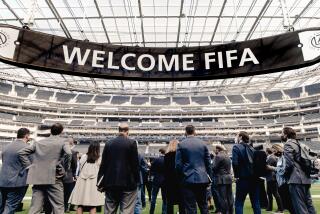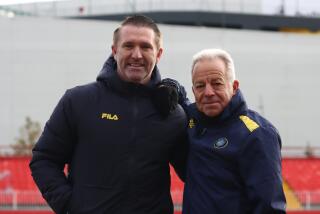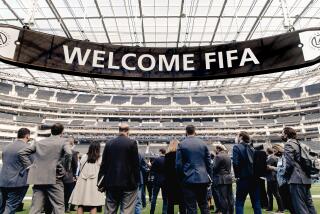World Cup: 250 days and kicking
- Share via
On Saturday, the countdown clock ticked past the 250-day mark.
That’s how many days remain before the 2010 World Cup kicks off at the cooking-pot-shaped, 95,000-seat Soccer City stadium in Johannesburg.
Ready or not, South Africa, here they come.
And they will come demanding much. Soccer’s global elite are pampered every bit as much as their American baseball, basketball and football counterparts.
Don’t believe it? Well, consider these “requirements” that the likes of England’s David Beckham, Wayne Rooney, John Terry, Frank Lampard, Steven Gerrard and all the rest will expect when they touch down in South Africa next June.
Former England international Gary Mabutt, who is advising South Africa’s organizing committee on training-base requirements, told BBC Sport that they go far beyond such things as swimming pools and electric security fences.
“Most teams want single rooms for their players, kitted out with Wi-Fi, plasma TV, satellite and Playstations,” Mabutt said.
“Remember that the teams are going to have one base throughout the World Cup and that their players will be spending a lot of time in them.
“They will probably also have a games room, where you have things like a pool table and table tennis. It’s also a requirement that training facilities must be either on site or within a 15-minute drive of the team hotel.”
England Coach Fabio Capello is drawing the line at one distraction. The WAGS (wives and girlfriends) who grabbed the headlines at Germany 2006 will have very limited access.
“One day after each game,” Capello said. “We are there to play, not for a holiday.”
Be prepared
Germany, which will clinch its place in the World Cup if it overcomes Russia in Moscow on Saturday -- no simple task, that -- already has booked its hotel in South Africa.
The German delegation will stay at the Velmore Grande, a five-star hotel near Pretoria that is scheduled to open in November.
The U.S., too, is planning to set up its headquarters in or near Pretoria. Coach Bob Bradley wants his team at altitude because 41 of the World Cup’s 64 matches will be played away from the coastal cities of Cape Town, Port Elizabeth and Durban.
Personal Omen I
The first World Cup I paid any attention to was played in England in 1966. I watched most of the tournament on a black-and-white television set in the window of an electric supply store in Wales next door to the shop where I was supposed to be working.
North Korea qualified for that event and surprised everyone, especially Italy, by reaching the quarterfinals.
Until now, it was North Korea’s first and only World Cup appearance. It was also England’s first and only World Cup triumph.
With North Korea heading for South Africa next year, could it be an omen? Could England win it all once again, 44 years after Geoff Hurst’s hat trick heroics allowed Queen Elizabeth II to hand Bobby Moore the Jules Rimet trophy at Wembley?
Stranger things have happened.
Personal Omen II
The first World Cup that I covered for The Times was played in Spain in 1982.
Italy won, although Brazil, even today, is still regarded as the best team in that tournament. The Brazilians’ downfall was that they couldn’t find a way to stop Italy’s irrepressible Paulo Rossi.
What ties 1982 to 2010 is that there were three teams for which Espana ’82 marked their only World Cup experience: El Salvador, Honduras and New Zealand.
Strangely, the same three countries remain in the running for South Africa 2010 as qualifying play heads toward the wire.
New Zealand, featuring the likes of former MLS players Simon Elliott and Ryan Nelson, has a fair chance of qualifying. It has to defeat Bahrain in a two-game playoff, but Bahrain is favored.
El Salvador’s chances should be brought to a crashing halt at Azteca Stadium in Mexico City next Saturday, when Mexico is among 11 countries that can secure a place in the World Cup.
Honduras, which is at home against the U.S. on Saturday, has the best chance of the three, but even it is no lock.
Security concerns
Nice to see the news item out of Frankfurt reporting that German police will be giving their South African counterparts a little advice on how to handle large crowds and unruly fans.
But it seems here that the delegation of high-level South African police officials visiting Germany are on more of a junket than anything else.
They would be better served staying at home and teaching their rank and file not to demand bribes from journalists, as happened on several occasions during this year’s FIFA Confederations Cup in South Africa.
Security has been a concern ever since South Africa was awarded the World Cup. The latest crime figures, showing 49.7 people murdered every day (18,148 a year) and armed robberies up as much as 41%, are not comforting.
Nor was the word from South Africa national team midfielder Steven Pienaar, who plays alongside U.S. starting goalkeeper Tim Howard at Everton in the English Premier League.
Hearing gunfire at night should not cause World Cup visitors any alarm, Pienaar said.
“They just have to know it’s normal, like hearing firecrackers,” Pienaar told England’s Sunday Telegraph.
Well, yes and no.
Just the other day, Bheki Cele, South Africa’s police commissioner, asked the government for permission to shoot alleged criminals in the back, a throwback to the bad old days of apartheid.
Even more disconcerting, Cele’s “shoot to kill” plan has received the endorsement of Nathi Mthethwa, the government’s minister for police.
So that sound World Cup tourists hear at night might not be “like firecrackers” at all. It might be the sound of someone dying.
--
--
BEGIN TEXT OF INFOBOX
South Africa 2010: Where
they stand
Eleven teams already have booked their place in the 2010 World Cup in South Africa and 16 more will do so by Oct. 14. The remaining five places in the 32-team tournament will be decided by playoffs. Here is the scenario:
ALREADY QUALIFIED
Australia, Brazil, England, Ghana, Japan, Netherlands, North Korea, Paraguay, South Africa, South Korea, Spain.
CAN QUALIFY ON OCT. 10
Chile: If it defeats Colombia.
Denmark: If it ties or defeats Sweden.
Ecuador: If it defeats Uruguay, and Argentina and Venezuela lose.
Germany: If it defeats Russia.
Italy: If it defeats Ireland.
Ivory Coast: If it ties or defeats Malawi.
Mexico: If it defeats El Salvador.
Serbia: If it defeats Romania.
Slovakia: If it defeats Slovenia.
Switzerland: If it defeats Luxembourg.
United States: If it defeats Honduras, or if Costa Rica loses to Trinidad and Tobago.
ALSO STILL ALIVE
AFRICA: Algeria, Burkina Faso, Cameroon, Egypt, Gabon, Kenya, Morocco, Mozambique, Nigeria, Togo, Tunisia, Zambia.
CONCACAF: Costa Rica, El Salvador, Honduras.
EUROPE: Austria, Bosnia-Herzegovina, Bulgaria, Croatia, Czech Republic, France, Greece, Hungary, Ireland, Israel, Latvia, Lithuania, Northern Ireland, Poland, Portugal, Romania, Russia, Slovenia, Sweden, Turkey, Ukraine.
SOUTH AMERICA: Argentina, Colombia, Uruguay, Venezuela.
WILL QUALIFY ON OCT. 14
Bahrain or New Zealand.
FIVE PLAYOFF SERIES
Fourth-place finisher in CONCACAF versus fifth-place finisher in South America.
Eight best second-place teams in Europe, from which four will qualify.
-- Grahame L. Jones







